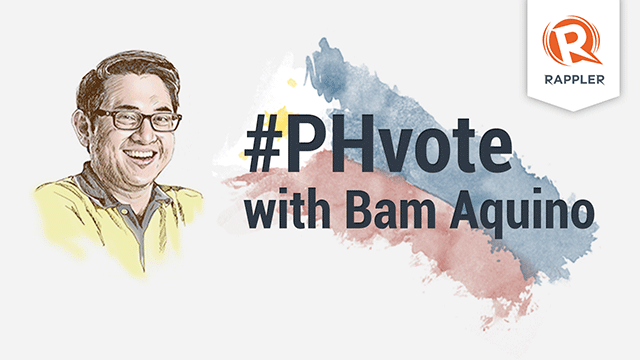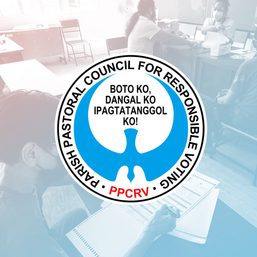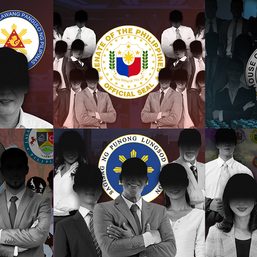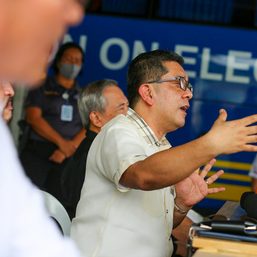SUMMARY
This is AI generated summarization, which may have errors. For context, always refer to the full article.


MANILA, Philippines – Rappler speaks with Team PNoy senatorial candidate Bam Aquino.
He is the former National Youth Commission commissioner and a cousin of President Benigno Aquino.
Aquino is the first Liberal Party member of the coalition to make it to the Magic 12 of the Social Weather Stations survey.
In a Pulse Asia survey released March 11, Aquino gained 11.8 percentage points, resulting in a 43.2% rating.
Aquino’s jump was enough to put him in a statistical tie for 4th-9th place with former Las Piñas Rep Cynthia Villar (44.0%), San Juan Rep JV Ejercito (43.8%), and Nancy Binay (42.5%).
Below is the script:
Hello! I’m Maria Ressa. Welcome to #PHVote.
Today we have Team PNoy senatorial candidate Bam Aquino. He is the former National Youth Commission Chairman and a cousin of President Benigno Aquino. Aquino’s had significant gains since senatorial preference surveys. He jumpeed from rank 15 in the Janauary sws survey to rank 9 to 10 in February. Today Bam, thanks for joining us.
BAM AQUNIO: Thank you and it’s my first time here in Rappler HQ, kaya excited ako.
MARIA RESSA: Hopefully you fit in, no no. Please if you have questions use #PHVote. Bam Aquino is also on twitter, @bamaquino. Let me just toss, why should people vote for you, Bam?
AQUINO: Well, first of all I think kami namang kumakandidato, we’re here to present ourselves and hope that the Filipino people will like what we have to offer. And when it comes to our candidacy, unang una we’ve spent a lot of years working in the National Youth Commission so the youth of course is our main focus area. We’ve spent years working on issues, concerns there, mga iba’t ibang polisiya, mga programa. And these are things we want to take to a higher leve; in the Senate. Secondly is for the past seven years, I’ve been working as a social enterepreneur. ANd i think this is not really talked about mainstream media but I think it’s quite significant that you have actual experience working in poor communities, with cooperatives, microfinance organizations, NGO’s. Being able to work with our people and really help them improve their businesses. And gumanda talaga mga buhay nila and palagay ko yung experience na yun importante yun.
So, those two things, those two big sectors are youth sector which is now I would think is the largest sector in the Philippines, and the sector of microbusiness owners which, by the way 90% of all entrepreneurs in the Philippines are sari-sari store, mangigingisda, fishball vendors, livestock raisers. This is a sector that needs help. It needs support. It needs… Our countrymen who are doing their best to help their families but largely do it on their own. Walang suporta sa gobyerno masyado. And this is a sector that you want to help and this is a sector that needs a lot of help. So palagay ko yung dalawang malalaking sector na yun, the youth and the entrepreneurs which also mirrors my own experience, my own work experience, having worked in those two large sectors, are sectors that we want to get a push or to get extra help. And, when I was talking to my colleagues in Hapinoy, in the other social enterprises that I’m part of and, at some point last year napagusapan namin na
yung gusto nating gawin para makatulong sa communities, dapat magibang role, magiiba talaga yung mga roles. Before I used to be on the ground, actually working with the nanays. But now you’re looking at another role, which is to go into policy and to see if on the mainstream policy side you can actually push for some of these reforms while our colleagues will continue the work in the communities.
RESSA: So you’re saying that the work you’ve done on the ground will actually help you formulate better policies?
AQUINO: I think so because you’re grounded. Alam mo talaga yung pangangailangan. In fact, one of our platform which is to push for support for micro and small enterprises, basically tatlo yan. Financing, which of course the microfinance sector, NGO’s, cooperatives. Access to training which is to help our entrepreneur, the entrepreneurs, the micro-enterpreneurs with their businesses, put in technology, bring in better know-how. And third of course is access to market, which is to alow them, yung mga produkto at serbisyo nila, to allow them to actually get to the market. So those three, hindi yan galing sa
4:00
for example, like a UN treatise on microenterprises. This came from the ground and this is what we saw. Yung pangangailangan talaga ng mga kababayan natin who were running their microbusinesses.
RESSA: But politics is a whole different other arena and let me just ask your experience in politics was under the Arroyo administration. You’ve been getting some flak recently.
AQUINO: A lot of flak actually.
RESSA: You should’ve, this is what’s some of the articles have said, you should have left the Arroyo administration based on principle, that you work for them. Tell me how you react. What do you mean by a lot of flak? What are you getting? And how do you respond?
AQUINO: A lot of the black propaganda actually is centered around that right now. But kung tutuusin, none of those really give a clear timeline. I was appointed in 2001 as Commissioner, by 2003 I was Chairman, by July or August I think was Hyatt 10 of 2005. And shortly after, I finished my term and I was not there anymore. And this is something that those articles never fail to mention. Kumbaga, they always fail to mention. They make it seem I was there til June 2010. I left, I finished my term and left government in
February of 2006. And what they do afterwards, we set up Hapinoy, which of course connected to the micro-finance industry, which is actually Tita Cory’s final advocacy before she passed away. We set up the reform coalition, registering vote with people like Jesse Robredo, Risa Hontiveros, Kiko Pangilinan. Again, the articles never talk about those things. So para sa akin, I guess it’s just really par for the course. Pag medyo umaakyat yung numbers mo, people will start putting these things out there and like the best black prop in the world, it’s always a half truth or partly true. And it is true. I was Chairman of the NYC and that’s not a secret.
In fact we proudly say we were Chairman of the NYC. And I think I was able to serve naman our youth well. So I’m proud of that time that we served the country well and we served the youth well. But afterwards, it’s very clear that by February of 2006, we were already into social enterprise and doing other things.
RESSA: I see. So when you say black propaganda are you saying this was orchestrated?
AQUINO: Definitely. Kasi pare pareho yung mga linya eh, no? So I really think it’s black propaganda. It is orchestrated. And it did come out when my numbers started picking up. Kumabaga, parang nung nasa number 17 at 20 tayo, wala naman silang sinasabi. And of course, once your numbers start going up, people start putting these things out there, you know. But end of the day I think, all of these things they’re saying, isa lang naman talaga yung kailangan isipin ng mga tao. Kung totoo nga yun, pipiliin ba tayo ni PNoy who is the number one enemy now of President Arroyo. Kung tutuusin, would the LP, would PNoy actually choose me in the slate? Would people like Risa Hontiveros, Jun Magsaysay, who are now running with me stand side by side with me in the slate? Of course not, diba? So para sa akin madali naman sagutin. Bilang isang tao lang, sometimes nakakainis lang na talagang kung ano ano yung mga binabato sa iyo.
RESSA: What are you learning about politics now? During the campaign period.
AQUINO: Well, alam mo there’s a lot of expectations of our, people really are expecting a lot from their leaders, rightfully so. And I think PNOy being the president now was also raised the bar. They want people who are clean. They want people who are honest. I think now they also want people who are effective. Who can actually do something on the ground, no? And, you know, pag kausap mo na yung mga botante and sinasabi nila “Sir, itong maliliit kong negosyo, ilang tao na to dito, hindi pa rin kami lumalaki. Mayroon ka bang magagawa diyan?” That’s not, that’s not something to be taken lightly no? Seryosong usapan yan. And talagan kung ikaw tumatakbo ka and you’re offering solutions, mapapaisip ka talaga no? These solutions really need to work for our countrymen because they really need a lot of help. On the other hand, nakikita ko din na ang mga Pilipino, even without the support of government, kinakaya nila eh. They are able to do well. When we started Hapinoy and Rags 2 Riches, wala namang tulong yun mula sa gobyerno. Now can you imagine if government really was indeed a partner of many of these micro enterprises? If government really support the young people? How much further could they go? And that’s what I’m trying to look at. Yun yung hope. Na kung, if government really gets it act, really supports its people with good policies, good programs, can you imagine how far our countrymen can go? Considering now that they do it largely on their own.
So yun yung nakikita ko on the ground. And, hindi ka naman ano eh, people have been asking if nakakapagod ba yung kampanya. And I have to admit physically nakakapagod siya. But, everywhere we go we meet youth volunteers, NGO’s, local government leaders. I’m sure baka some people might be skeptical but indeed, local government leaders who are doing their best to really you know, kumabaga, just do their best with what they have and really support our people to move forward.
Nakikita ko yun eh. And everywhere we go, ako honestly I’m inspired to just keep on going because these are good people, mabubuting mga Pilipino who are trying their best and ikaw, you also want to, you want to pay back their effort and also more effort and an extra push this election time.
RESSA: One of the greatest criticism against our Philippine democracy is really, weakness of our institutions. One of the things it’s come out for sure right now is the weakness of the political parties, which you’re seeing in the campaigns, right? How are you dealing with this?
AQUINO: Well, honestly you haven’t really raised it I’m gonna raise it na, the question on dynasty. People have asked, ano ba yung long-term solution sa dynasty? Ang tingin ko, it’s actually strong political parties. That can actually kumbaga, the dynasties won’t be as important anymore. You have a country like the US. For the democrats, they have the Kennedys. For the Republicans, they have the Bushes. And yet it doesn’t seem to be that much of an issue because clearly defined anong, kung ako Democrat, ano yung ibig kong sabihin, kung ako Republican ano yung ibig kong sabihin.
On each particular issue, very very defined. We don’t have that now. So what we have are basically parties built on personalities. And family names. But, I really feel that if parties can mature and become stronger down the line, yung usapin ng last name won’t be as important no? It’ll already be an, usapin yan ng ano ba yung stand ng partidong ito sa ganitong issue, sa ganyang issue. Medyo malayo pa tayo doon no? But I think little by little we can get there. For example, sa Liberal Party, there’s a move to include individuals who aren’t just politicians. And I think that’s a welcome move. To really push for more membership who aren’t all mayors, governors, congressmen, and senators. We have, if there can be journalists, businessmen, doctors, lawyers, i think in that way no, mas magmamature yung partido. And, i’m hoping that before i’m dead, i’ll be able to see really mature parties in the philippines.
RESSA: Maybe before you dead, but may not make it to mine. Let me throw you some questions from social media. Thank you very much for these questions. @VenatusNOJ Ano pwede niyang gawin sa senado without the influence of his uncle PNoy, para ibigay namin ang boto namin sa kanya. This is basically that thing.
AQUINO: Her name is VenatusNOJ, @VenatusNOJ?
RESSA: This is really that question aside from your uncle’s name. It’s uncle but I know it’s your cousin and what can you do in the senate on your own.
AQUINO: Well unang una, thank you for the question. Truth is, a lot of people will probably make that assumption na the president and i are parang, iisa yung boses no? But the truth is, in history, if you look at the aquinos’ different stands on issues, there was never a time when we acted as a monolitihic group no? We all had our own issues. We all focused on different areas and we all had our own stands. Sometimes they didn’t necessarily agree with each other.
Right now I think the president is doing a good job and especially itong good governance thrust. It’s something that we need. But on particular issues, i think the senators, not just myself but everyone on team pnoy, are actually free to make their own decisions on particular issues. But that being said, our focus is really jobs, especially for young people, support for microbusiness owners which of course includes financing, training and access to market, and reforms in our education system to make sure that the job mismatch isn’t as large as it is now. Let me talk about the first one first, jobs. Many people have talked about unemployment numbers natin. Even with the growing economy ang tindi parin ng unemployment problems natin and underemployment problems natin. So we need to focus on that. For the youth, we need to focus it even more because the largest sector of unemployed are the youth no? Yung pinakamalaking sector na unemployed ngayon, mga kabataan.
And ngayon, Marso na, maraming graduate, hindi sila sigurado kung mayroon silang trabaho o wala. And that’s something that’s not acceptable. If you are, you know the few that are able to get to college, siguro naman dapat pag graduate nila dapat may mga trabaho naghihintay sa kanila.
Kung matapos ka ng K-12, dapat with the skills you get with K-11 and K-12, you should have a job already waiting for you. So there are a lot of reforms that need to be done to ensure that our people, especially the young, have these jobs. We also talk about the job skills mismatch. There are now 500,000 nurses na hindi sa nursing nagtratrabaho. Either iba yung trinatrabaho nila or wala silang trabaho. Can you imagine half a million Filipinos went to school, paid their tuition fee, baka nag part time job pa, nag review class which we all know is also expensive, baka nag intern pa sila, only to find out na walang trabahong nandyan. How did that happen? How in this day of information technology and the internet telling you about job forecast, how did that happen?
Obviously, meron talagang failure of communication or failure of the process, there was really something wrong there. So there’s a lot of reforms that need to be done with our schools, with regard to industry and how to make sure that the graduates we were able to produce have the jobs that they want, that they studied for and that pay them properly no? I spoke about this in, kung hindi ako nagkakamali, sa Baguio. And parang I was telling them yung population ng Baguio ata is about 500,000. So I was telling them, yung dami ng mga nurse na walang trabaho or pinapasukang trabaho, kasing rami ng buong populasyong ng Baguio city, which really caused their jobs to drop. I mean ganun katindi yung problemang yan. So if we want to focus on jobs, there are reforms that need to be done sa education system. It cannot just be enrollment to graduation, it has to enrollment to job placement. And I know that there are people siguro who might react and say, “Oh, schools need to be disassociated from industry.”
But ako I take another view which is they need to be associated. Hindi naman, wala namang pinipilit, no? There are some countries that force you to take a course. But that information needs to be there and earlier on in second year or third year, you should already sort of now kung ano yung trabahong gusto mong makuha, ano yung skills na meron yung kailangan ng kompanyang yon, and kung wala ka ng skills na yun hindi pwede na at 4th year, doon ka lang maghahanap tapos parang swerte swerte lang kung may trabaho ka o wala no? So there’s a lot that needs to be done there. SO that’s job and education. And of course yung support for businesses. That one naman is very close to my heart because as you know we’ve been together in different fora, I talk about social enterprise and helping our countrymen from the communities really develop sustainable businesses no? Bakit importante yan? Importante yan dahil kung isang tao natulungan mong magkanegosyo, magkatrabaho, unang una ang laki ng dignidad na mayroon. The dignity that comes with earning for your family is there no? Secondly, it’s sustainable, you don’t need to keep on giving dole outs because once you’re able to get them on the right path, hopefully, they’ll be able to be sustainable and support themselves already.
And third, yung kakayahan ng Pilipino nasasayang eh. Kumbaga, my core belief is that Filipinos, magaling, matatalino, masisipag, may kakayahan. Kulang lang ng opportunities, no? Opportunity na makapag-aral, makapag-trabaho, makapag-negosyo. But, if the programs are there and this is what I’ve seen in social enterprise, if the programs are there, if the policies are there, the interventions are there, you can trust the Filipino can get themselves out of poverty. Kung nandiyan yung tulong. Pero of course, kung kanya kanya, talagang mahihirapan ka. But, if you have support from government, from the private sector, helping you and helping you get to a point where you can stand on your own feet, that development I think is what we need in our country. Yun yung hinahanap natin na People Power talaga, na hindi lang basta basta binibigay yung dole outs. Talagang, yung totoong empowerment, financial, political, it all comes from Filipinos being able to stand on their own feet, earn for their families on their own, and the next step there is making better decision for themselves, for their families, and for their community.
So that’s we will really try to focus on and hopefully if given a chance, we hope to really bring in these reforms to the Senate.
RESSA: Well what’s great is you have conference, you have the funnel, you have the experience, to where you wanna go. But you say with such certainty, I mean for example, giving jobs right? Many people older than you have tried to do this. How will you work this system that’s been there for now nearly thirty years, twenty-seven years since Edsa, which hasn’t really given these jobs. I mean, every politician says jobs are important and yet we have ten million Filipinos who are forced to go, the middle class forced to go abroad. How do you take this vision in the context of the reality of the systems? Or lack of it? How will you function as a politician I suppose is what I’m asking.
AQUINO: Yung as a politician, let me set that question aside first. But probably I will look at it from the point of view of an entrepreneurs. Because entrepreneurs are natural problem solvers.
RESSA: They are, but you have to work with other longstanding politicians who may be working against you. How will you deal with this?
AQUINO: Well, just to my point. Entrepreneurs are natural problem solvers. They work with the market, they work with what’s there, they work with what they have to achieve the goals that they set out. Iba siya sa isang advocate no? Or maybe, iba yung pananaw sa buhay eh no? Pero bilang isang entrepreneur, what I’ve learned is that you know, if you’re able to work in scarcity, as entrepreneurs usually do, you work in scarcity, you try to get all the stakeholders in. You don’t shun away people. You try to get as many people on board. And, little by little, you start very small and you grow it little by little and you use, of course, perseverance and passion is important. But at the end of the day you use tried and tested you know, metrics, formula, the best things that you can learn from other countries and other projects no?
That’s how I would tackle large problems. Hindi lang siya tipo na pulitiko na basta ako tama, kayo mali no? In a debate ganun yun diba? May positive, may affirmative atsaka negative side. An entrepreneur has that goal and will try to find the best and the most efficient way to achieve that goal. And I think that’s what we need. We need problem solvers right now. I’ve, I was an advocate also at some point no? Naging aktibista rin tayo no? But having gone through the process of working in government, working with different stakeholders in social enterprise, nakikita mo na may mga ibang paraan. There are different ways to do things which probably can yield results right away, or results that our countrymen need. For example with regard to jobs, it’s really difficult for me to see the problem as an entrepreneur because all the stakeholders want to work with each other. The industry wants to work with schools because para sa kanila, kung mayroong mga skilled workforce mas madali buhay namin, it’s less cost for us. The schools they want to produce quality graduates because if they don’t produce quality graduates, they’re gonna get closed down or no one’s gonna enroll in their schools anymore.
Government wants nothing more than for unemployment rate to go down. And yet, hindi parin siya nagkakatugma. It’s still a quagmire no? So, you know, as an entrepreneur you look, you look at the whole system, a systems approach, a systems thinking, and you say, all the stakeholders seem to want to work with each other. Wala ngang opposing force eh. And yet hindi pa rin sila nagkakatugma. So, maybe you’re role can be you know, somebody there in the center bringing in all these stakeholders together.
RESSA: So from what you’re seeing, what is preventing that from happening?
AQUINO: I’m not sure.
RESSA: Corruption?
AQUINO: Could be. Could be a lack of reaching out to each other. You know, throughout our society…
RESSA: Vested interests?
AQUINO: Probably vested interests but alam mo but most likely it’s just a lack of coordination. My sector is my sector, your sector is your sector. Hindi tayo nag-uusap kasi magkaiba tayo ng sektor.
RESSA: Do you see opportunity?
AQUINO: Well, entrepreneurs always see opportunity. Going back to Hapinoy. Hapinoy’s our perfect example of… we started from zero. I left government, I was jobless. My business partner si Mark whom you know, left Unilever, we’re both basically unemployed. I still had a TV gig on the side but as you also knew it was really a small thing lang. We started with practically nothing. We started with our own savings and we just started to get different stakeholders to come together. The microfinance sector helped us out. We were able to get a few companies to help us out. We were able to get NGOs to help us out. Of course the Nanays who were at the center of everything. Paunti-unti na-refine yung model, nagkaroon ng suporta, we were able to bring it to 14 provinces and that’s the benefit of being an entrepreneur. If you can build something from scratch, literally, with all these different stakeholders, and to reach…well, you know, all modesty aside, Hapinoy has actually gotten quite large. Hopefully this type of intervention where you can affect so many types of Filipinos, if you had government supporting you, can you imagine how much more the scale that you could actually bring these services to even more Filipinos. So, maybe one unique thing is hindi ka talaga… pulitiko mindset is only one of the many hats you can wear. You can wear other hat like the entrepreneur hat, or the activist hat. Depending the situation, you can actually choose what’s the best way to move forward.
RESSA: Let me ask you about one of the fears you brought up. Dynasty. Part of the Aquino family. This family is in power. The fear is that, this power will be used for personal gain. For example, something that has nothing to do with politics – Kris Aquino’s love life brings her sisters on national, on primetime television. When the Aquino family comes out collectively like that one can’t help but think about the fact that they are connected to the president. What kind of assurance will the people get that you will not use this in a “dynastic” way. Use the power in a way that is for personal gain?
AQUINO: We never have. I look at my family members who have been in politics. They are people who gave their lives to the country. I look at Tito Ninoy, Tita Cory. Tito Ninoy buhay niya mismo yung binigay niya. Tita Cory naman, of course, in the 90s a lot of people disagreed with her, nobody questioned her integrity.
RESSA: I think on the big picture. The Ninoy, Cory Aquino it’s something trivial actually if you look at it. Kris Aquino with her sisters, with Ballsy…
AQUINO: I don’t think anything was wrong with that. Ate Kris needed a lot of support at that moment and of course her sisters were there. Why shouldn’t they be there, of course they are their to support their sister. I don’t find anything wrong there.
RESSA: Where do you draw the line taking the power of the family to help a family member when the family includes the top office in the land?
AQUINO: Well, I think in the case of Ate Kris naman, that was a personal matter. She didn’t really bring in the president in any of her statements, to be honest. In fact, I thought.
RESSA: It was just like a Damocles sword though. I mean, again, I’m just… these are the comments that have come out.
AQUINO: It’s the comments but the truth is probably less controversial. One of our family members needed help and her sisters were there to support her and the way I see it, it’s really as simple as that. It probably has nothing to do with politics to be frank. I don’t really see how it’s connected to politics, of course, it came out during the campaign period. Again, I don’t think it will really affect the advocacies that we’re pushing for, the issues that we have espoused so I hope that things are resolved with Ate Kris. Of course, I support her as her cousin. But I really think that’s really more of a personal matter rather than something in politics. You’re seeing something that I can’t see right now.
RESSA: It’s actually… it starts with personal e. So, definitely it’s a personal matter but when you bring together the Aquino power in a personal issue in support of a family member, inevitably, the public… where will the lines be drawn by the Aquino family?
AQUINO: I think it’s pretty clear naman. I don’t think we’ve been… even in that sense, I don’t think we overstep or family members overstep their bounds. I mean, Ate Kris is a public figure even before the president ran, obviously, and she’s her own person. I really can’t see what you’re saying but in terms of the past and the present I think you can even say that Tita Cory was careful, was extremely careful about wielding power that could be misconstrued as personal. And that’s still my inspiration. That type of leadership and governance, that’s still my inspiration so, ako, honestly if you talk about a dynasty as having one place or a business interest that they are protecting, I can’t really see that we fell into that trap or we are those types of people. What I see is that we have a history of public service and many of us youngers ones are inspired by our relatives who gave so much to the country. To be very frank no. So, I hope that people won’t take it against us that because of that inspiration, we also want to serve and have served the public in different ways.
RESSA: In your campaign now, the fact that you’re an Aquino, is that a plus or a minus?
AQUINO: Both! Right now, though, I think it’s more of a plus. Pero may minus pa rin yan. Yung plus, I think, obviously the president is quite popular and he clearly defined what the role of Team PNoy is. Sabi niya, yung grupong ito, ito yung magpapatuloy ng mga repormang nasimulan na natin. So very clearly defined what we stand for. But in terms of, when my name was first floated, automatically there were people who were not friends of the president and who are not his supporters who are against me automatically. And in fact, some of the things that they had mentioned, you just needed to google my name and probably masasagot na yung ibang mga tanong dun ano, but the automatic reaction was thore. I’m hoping na now na campaign period na, people will look past our last name and really look at ano ba yung nagawa na ng taong ito, ano ba yung gusto niyang ipaglaban pa para sa bayan natin, ano ba yung mga pinaglalaban niya, pinaglaban na niya, at ipaglalaban pa niya. And again, in the age of information technology, everything’s out there. Walang sikreto, walang secrets di ba? So, I’m hoping people will look at our Benigno Bam Aquino fan page if I can plug it now and just look at the things we’ve done there. The work we’ve done with hapinoy the national youth commission. Ask around also about people we’ve supported, who have parted with us. And hopefully, if they have any fears about not having a track record to bank on, hopefully that will allay people’s fears.
RESSA: A lot of questions about national security issues. I’m going to throw several of them. From @masterann11, What’s your stand about the Philippine-South China Sea dispute?
AQUINO: Well, unang-una, yung atin, atin yan. We shouldn’t allow ourselves to be bullied by China even though they are practically the only superpower left right now. We shouldn’t be bullied by them. We should stick to our claim and hopefully really push a diplomatic position because obviously, arms solution will not lead anywhere. I really think wars in general or armed struggle is not really of this day and age anymore. So hopefully, we can push for that in the right fora or the right forum but we shouldn’t let go of the land that’s ours.
RESSA: This is from @yusufledesma and imran pangilinan. How will you handle the Sabah claim in the senate? What about a platform for Muslim Filipinos?
AQUINO: Unang-una, the thing we should focus on sa Sabah unang-una yung lives nung mga, yung kapakanan nung 800,000 na mga kababayan natin doon. That’s the first because they are the ones who are getting abused. They are the ones who are getting wrongfully accused of different things. So that’s the first order of business. Second are our economies in Sulu, Tawi-tawi, Basilan, and Zamboanga, because a large part of their economy were dependent on Sabah. So a lot of our countrymen who used to get their livelihood from Sabah are having trouble right now. Pangatlo, yung mga bumabalik sa Pilipinas. We get reports of hundreds of Filipinos coming back to the mainland.
RESSA: Almost 5,000 now.
AQUINO: 5,000 already. Hundreds per day ano. And they’re leaving their homes they’re leaving their businesses, they need a lot of help and a lot of support and this is the time of support na pang DSWD. Even before talking about getting them back on their feet and getting them jobs, you have to give them the primary support first. Pang-apat, palagay ko pagdating sa Sabah yung claim natin. Admittedly, that claim was dormant for a long time. We should get some finality on this issue and put out the proper claim the same way we want China to get solved through a third party tribunal, hopefully we can do the same for Sabah.
RESSA: This one from @roskiecruz, What is Bam Aquino’s stand on the situation on UP and the death of Ms. Tejada?
AQUINO: It was really ano, masaklap talaga siya ano. Why? Unang-una, mataas yung grades niya. Pangalawa, malinaw naman na nangangailangan siya. She was in the D economic bracket. And she asked for a loan. She didn’t ask for a grant or a scholarship. She asked for a loan. And if I’m not mistaken, the loans in the past nababayaran naman nya. So hindi ko maintindihan kung bakit hindi sya hindi nabigyan ng tamang suporta, tamang tulong. Masakit talaga. A lot of people from UP, I’m not an alumni of UP but a lot of the UP alumni have really spoken out already and I support a lot of their wishes to change the policies of UP Manila and hopefully, other schools will follow suit. Now, pagdating dun sa socialized scheme, in general, I’m not against it because by having higher paying students, they are able to subsidize the students who cannot afford. But today I was able to look at the breakdown of students from A to E and yung karamihan pala A and B. Yung C, D, and E mas ka-kaunti. And you can verify that with UP. There’s something wrong there na yung karamihan ng mga estudyante sa UP, I think, I’m not sure if this is UP system or UP Manila, A and B yung mas marami. Yung C, D, and E yung kas ka-kaunti. There’s something wrong there. Considering that it is the University of the Philippines. If you look at our socio-economic structure A and B is less than 10% of the country or actually less than 1%. A,B, and C is less than 10%. Siguro naman we could see some sort of mirroring of our demographics and enrollment in UP. So, I’m hoping that this could be a period of reforms and I think the UP heads naman have already said that it is a period of reforms and they will look again into their system. But sana, on a very personal level, huwag na mangyari yung mayroong kabataan na mataas naman yung grado, humihingi naman ng loan, hindi naman siya humihingi ng pera. Clearly nangangailangan siya at hindi pa rin nabigyan ng tulong.
RESSA: I’m switching, taking you to a gamut, from @PiaAngeli, what’s your stand on the RH bill?
AQUINO: Well, it’s already a law. It has to be, it should be implemented properly. Nakalagay kasi sa batas na it should be implemented without bias and I agree with that. If we have our Catholic…the priests, the bishops and some of the organizations, ang fear kasi nila is pipilitin ang mga tao na gumamit ng mga bagay-bagay na ayaw nilang gamitin. The law is against abortion. The law does say that it should be implemented without bias and that’s how it should be. I’ve talked to a number of Catholic leaders also and I’ve told them no, if this is implemented the wrong way, which is pinipilit yung mga tao sa ayaw nila, I will be the first to stand with you and say its should be implemented the right way. But at this point, I’m hoping that it is implemented properly.
RESSA: From @NoblePine, let me pull it out broader now, he outlined his steps for new kind of politics and one which may redistribute wealth from rich families to a greater majority.
AQUINO: Actually, let me answer the second question first. When you try to get more jobs in a community, or when you try to support small businesses or micro businesses, that’s redistributive. If you’re talking about investments you’re increasing the pie. Pinapalaki mo yung pera na pinapaghati-hatian.
RESSA: APEC is actually saying if you can get SMEs to take 90% of your economy then you’ve actually distributed money throughout.
AQUINO: It’s redistributive ano. Kasi many people have told me in the past, especially when… before politics. They would say, Bam bakit ka naka-focus sa mga micro e ang liit-liit niyan di naman yan nagdadala ng bagong pera sa komunidad. And I tell them, maybe it won’t bring in more money but it will redistribute wealth. Which is more important, I think, for our country. Our inequality is still quite high. In fact, it’s one of the highest in the region. Even though our economy is doing really well, so medyo may problema tayo diyan.
RESSA: If you’re waiting for a trickle down it will take time and it will policies to do that.
AQUINO: You need policies, you need programs. One, support our micro and small enterprises. That is redistributive. That will bring in more money to the hands of people who really need it more. And we’re talking about financing, training, access to market. By bringing in more jobs, we’re able to make sure that the community is able to benefit from these investments coming in. That’s distributive. The focus that we have in terms of helping our poor countrymen is really focused on that. Mas distributive siya. Of course, we’ll support the good governance measures which are bringing in more investments, oo naman. Pero palagay ko ngayon yung kailangan tutukan talaga is to help bring in programs and projects that will help redistribute wealth in our country.
AQUINO: Now, the question on new politics. I don’t have an answer for that right now but I’m hoping that by… through leading by example you will attract the other leaders… and I’ve seen this on the ground. Yung mga young mayors, young congressmen, board members, young councilors, kahit papano kapag kasama natin sila, bubulungan ako, alam mo tayong mga bata we should stick together kasi bago na yung mga pananaw natin. I know it sounds very motherhood but I’m hoping that as the years go on, if we get there, to the senate, we can help, bring together all of these like-minded young officials who have a different way of thinking, who are willing to push boundaries, who are not completely beholden to patronage ways and can push for innovative ways. Hopefully we can play a role there to bring people together and usher in new type of politics which of course comes from new type of leadership. Hopefully we can play a part there. I’m not exactly sure how to do it yet…
Visit #PHvote, Rappler’s coverage of the 2013 Philippine elections. Get to know the candidates through our comprehensive profile pages.
Share this page and pledge to #votesmart by clicking on the button below.
|
|
|
– Rappler.com
More from Rappler’s 2013 Philippine elections coverage:
Add a comment
How does this make you feel?




![[PODCAST] Beyond the Stories: Ang milyon-milyong kontrata ng F2 Logistics mula sa Comelec](https://www.rappler.com/tachyon/2021/11/newsbreak-beyond-the-stories-square-with-topic-comelec.jpg?resize=257%2C257&crop_strategy=attention)



There are no comments yet. Add your comment to start the conversation.